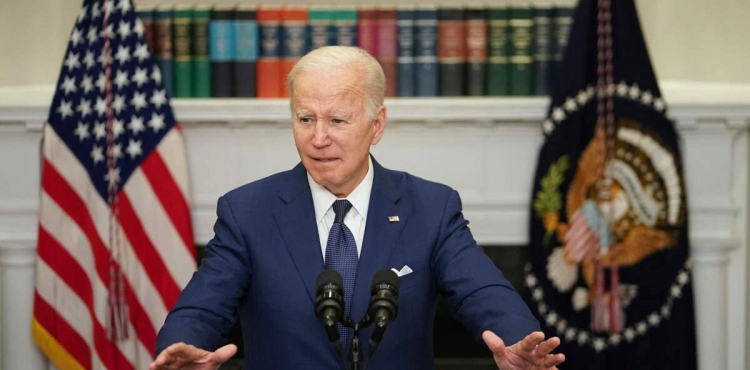The White House has included a two-state solution to the Israeli-Palestinian conflict as one of its priorities in the 2022 National Security Strategy unveiled by the Biden administration this week.
The document states that the United States will continue to promote a viable two-state solution that "preserves Israel´s future as a Jewish and democratic state while meeting the beliefs of Palestinians for a secure and viable state of their own."
The constant call for a two-state solution comes as part of the plan to "support calm and integration" in the Middle East.
While Israeli Prime Minister Yair Lapid appeared to support a two-state solution at the United Nations last September in his speech to the UN General Assembly, Israelis still overwhelmingly oppose such a move, with a recent poll showing that only 32% of Israelis expressed support them.
"An agreement with the Palestinians, on the basis of two states for two peoples, is the right thing for Israel´s security, for Israel´s economy, and for the future of our children," Lapid said in his speech to the General Assembly.
The US National Security Strategy includes a commitment to facilitate Israel´s relations with its neighbors and other Arab states through normalization agreements known as the "Ibrahim Accords" that were signed under President Donald Trump, Morocco, Bahrain, the UAE, and Sudan.
The strategy echoes President Biden´s statement in the occupied West Bank last July when he stated, "The two states along the 1967 lines, with mutually agreed exchanges of territory, remain the best way to achieve equal security, prosperity, freedom and democracy for Palestinians as well as Israelis."
The Strategic Security Document announced last Wednesday does not provide a roadmap for negotiations for a two-state solution, and there are currently no ongoing efforts.
The past few weeks since Lapid became prime minister have witnessed a noticeable increase in the intensity of the Israeli occupation army´s aggression and its nightly raid on the Palestinian occupied camps and towns, killing and wounding dozens of Palestinians, including several children, prompting the Palestinian resistance fighters to call for “days of anger” in response to the continued The Israeli closure of the Shuafat refugee camp in Jerusalem.
For Iran, the National Security Strategy highlighted a US plan to pursue "diplomacy to ensure Iran can never acquire a nuclear weapon," but added that the United States would remain "prepared to use other means" if diplomacy fails.
"We will continue to work with allies and partners to enhance their capabilities to deter and confront Iran´s destabilizing activities," the strategy says.
The document also confirmed that the US will not hesitate to support the administration in Iran, which is what the US President is doing on Friday in a meeting with Iranian-Americans, stressing: “We will always stand by the Iranian people who are struggling for the basic rights and dignity denied by the regime in Tehran.” For a long time".
It is noteworthy that the negotiation for a return to the Iranian nuclear agreement, from which the United States withdrew during the era of Donald Trump (2018) has receded and froze, with the continuation of protests and civil unrest in Iran, where government forces are Suppressing protests sparked by the death of Mahsa Amini in police custody in September .
On Wednesday, the US State Department said the nuclear deal was "not our focus right now," and instead focused on supporting the protesters in the Islamic Republic.
On China, Biden outlined a three-dimensional strategy of "external competition" with China, which the strategy regards as a major global economic power as well as a competitor with the intent and means of "reshaping the international order."
The China-related plan focuses on investing in "the foundations of our strength at home," aligning efforts with our "network of allies and partners" and responsible competition with the People´s Republic of China.
The strategy also emphasizes the United States´ interest in maintaining stability across the Taiwan Strait, a point of contention with China, and redoubled its opposition to Taiwan independence.
With regard to Russia, the National Security Strategy includes a pledge to stand by Ukraine in its war against Russia, adding that it will work on its economic recovery and encourage its integration with the European Union.
Biden described Russia´s foreign policy as an "imperialist" power bent on upending the international system. The strategy promises to "defend every inch of NATO territory" and prevent Russia from achieving its goals through the use or threat of nuclear weapons.
The US State Department announced last month that it would add an additional $600 million in US weapons and equipment to Ukraine, bringing total US support to Ukraine to $15.8 billion in military aid to the country since the start of the Biden administration, State Department Spokesperson Ned Price said on Monday. Tuesday, 11 October 2022.
Biden´s national security strategy highlights the two-state solution within 67












